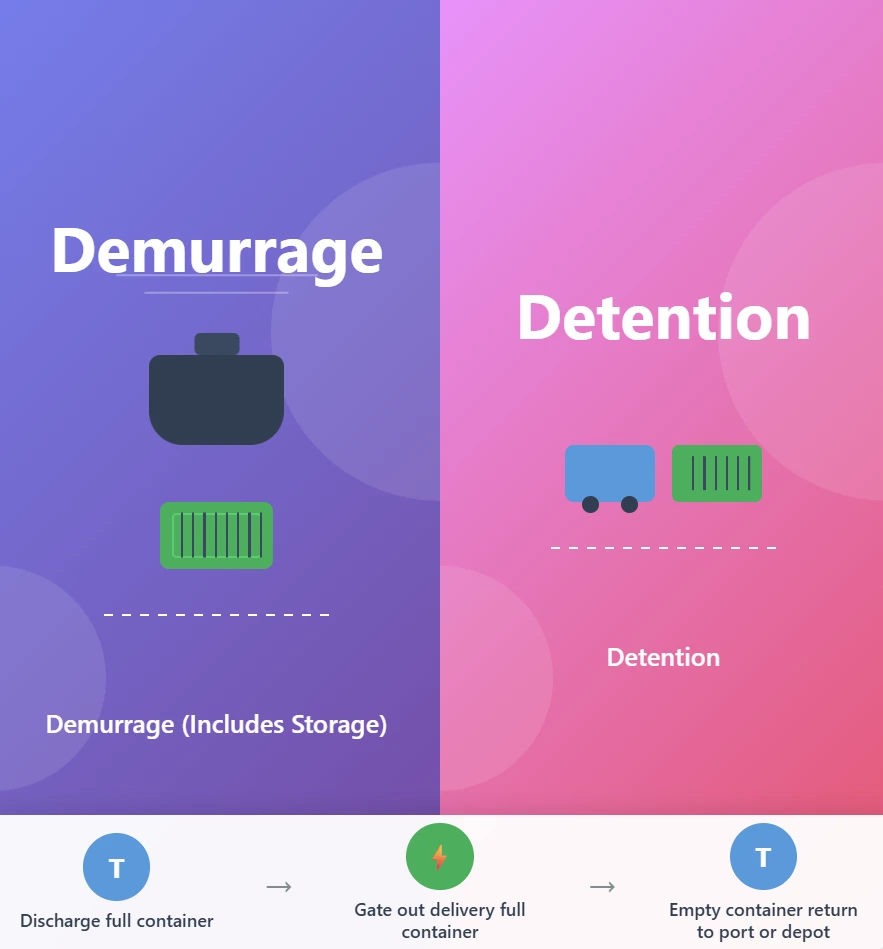.png&w=3840&q=75)

.png&w=3840&q=75)
17-09-2025
Understanding a Demurrage Charge and How to Calculate It
Demurrage and detention are crucial aspects of the freight transport sector that you must understand. This is because paying for the demurrage charge could disrupt your company’s cash flow.
So, what is a demurrage charge, and how can it be avoided? This article explain the concept of demurrage in logistics. Read on to the end to gain a deeper understanding!
What Is Demurrage?

In the logistics context, a demurrage charge is a penalty a company must pay when they are late to unload their cargo from the terminal, exceeding the agreed-upon due date on the shipping contract. It means that your cargo spends a longer time in the terminal and goes beyond the deadline.
It is important to note that the container unloaded from the vessel and placed in the terminal must be immediately transported within the agreed-upon time frame. This is to maintain the container usage flow for the next cargo.
A demurrage charge is paid as a penalty for hindering the delivery flow from a harbor, airport, or station. Therefore, you must be responsible for your cargo and ensure that you follow the schedule.
Then, who should determine and pay for the demurrage charge? It is decided by the owner of the container storage area or the shipping company.
On the other hand, whoever is responsible for the cargo and listed on the contract, such as the importer, exporter, or freight forwarder company, must pay for the charge. The amount of the fee depends on the terms and requirements in the shipping contract or bill of lading.
Read also: 9 Dangerous Goods and a Guide to Transport Them Safely
The Cause of Demurrage Charge
Aside from late cargo pickup, you can also get fined when your cargo is temporarily detained due to customs-related problems. This will obstruct the scheduled delivery process.
Demurrage charges may also be imposed for reasons beyond the control of the cargo owner, such as bad weather, global events, labor shortages at ports, vehicle unavailability, courier strikes, and sudden customs inspections.
In essence, demurrage charges are imposed due to causes that hinder the flow of ship deliveries. The entire supply chain may be impacted if the shipper causes a delay in departure, which could also affect the transportation of other goods.
Imagine this: The unloaded and loaded cargo at Soekarno-Hatta Airport in 2021, according to Badan Pusat Statistik Provinsi DKI Jakarta, reached approximately 500 million for both domestic and international delivery.
As a result, the delivery must adhere to the existing timeline so that the cargo can be unloaded and loaded efficiently.
How to Calculate a Demurrage Charge
Demurrage charges are calculated from the expiration of the cargo pickup deadline at the terminal until it is transportedafter the deadline. The total cost depends on how many hours or days your cargo remains at the terminal after the due date.
Generally, demurrage charges are calculated per day or per hour, depending on the type of cargo, port policy, and other specifications. For example, cargo that requires special handling may incur higher demurrage charges because the terminal must continue to store it even though it should have already been picked up.
In brief, demurrage charge can vary between harbors and the involved parties because it is customized to many parties. In fact, the fees have been agreed upon by the shipper and port parties, as well as signed on the legal contract.
On average, a demurrage charge is between USD 75–300 per container per day. It will increase the more you are late in emptying the container.
The Difference Between Demurrage and Detention Charges

When we talk about demurrage charges, you will also hear about detention charges. The difference lies in the causes.
Demurrage charges are imposed on shippers who are late in moving their cargo from the terminal. Meanwhile, detention charges are imposed if the shipper is late in returning empty containers to the terminal after the deadline has passed.
Demurrage is assessed when a full container is left at the terminal after the allotted time has passed and is not picked up by the designated person. The period of time when there are no fees for items that are still at the terminal is known as free time or grace time.
Free time is usually discussed between the shipping company and the cargo owner. Generally, it can range from 10 to 21 days. However, some companies also offer a short period of free time, like 2 to 5 days.
On the other hand, detention is calculated from the time the cargo owner receives the container until the empty container is returned to the terminal. This fee is usually regulated by the shipping company.
Read also: Understanding Free On Board (FOB), Types, and Advantages
How to Reduce a Demurrage Charge

As explained before, you must pay a demurrage charge if you “obstruct” the delivery flow by being late in picking up the cargo. To prevent this, you can do several tips below:
- Plan your loading and unloading process carefully.
- Always stay up-to-date with terminal policies.
- Ensure that all shipping documents are accurate and error-free to avoid goods being held up at customs.
- Work with freight forwarding agents who are familiar with the procedures at the destination port or airport.
- Maintain good communication with the parties who will handle the cargo.
- Use a monitoring system to track the status of your cargo shipment.
- Avoid harbors or airports that are often full. You may also consider using multimodal transportation.
- Negotiate to determine free time to avoid demurrage charges.
- Choose a flexible shipping schedule that is still in line with the company's operational plans.
- If possible, choose offshore container storage facilities to make it more affordable.
- Always have a backup plan in case the main shipping plan is hampered.
- Understand every detail of the shipping contract.
That concludes the information you can learn about demurrage charges. A demurrage charge is a fine you must pay when you are late in picking up your cargo in the terminal. To prevent paying fines, make sure that you plan your delivery well.
Also, to ensure that the delivery is smooth, you must choose a reliable logistics company! If you need chemical and gas shipping services, you can choose Chandra Asri Group!
Chandra Asri Group, through PT Chandra Daya Investasi Tbk, is ready to serve chemical and gas delivery with the proper logistics solutions. We have nine vessels with a capacity of 5,000–106,650 DWT. The number can increase in the future.
In addition to sea transportation, Chandra Asri Group also serves land transportation with PT SCG Barito Logistics and PT Chandra Cold Chain. We have 155 trucks and warehouses in Cilegon and Java.
Do not wait any longer! Rely on Chandra Asri Group for chemical and gas logistics!
Read also: Logistics Management: Functions, Benefits, & Main Components
.png&w=3840&q=75)
.png&w=3840&q=75)